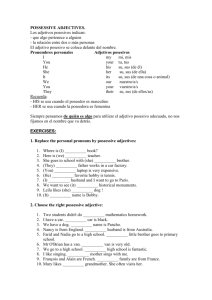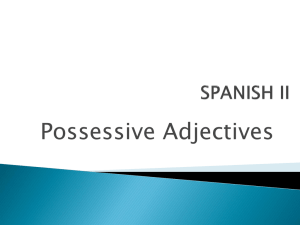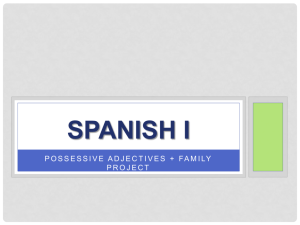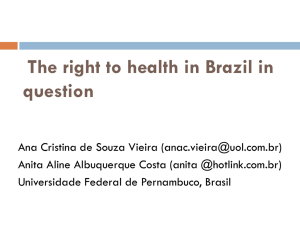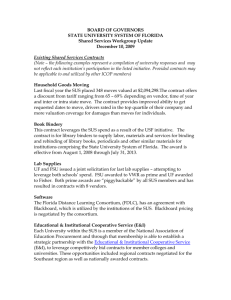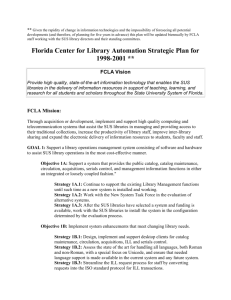Expressing Posession in Spanish
advertisement
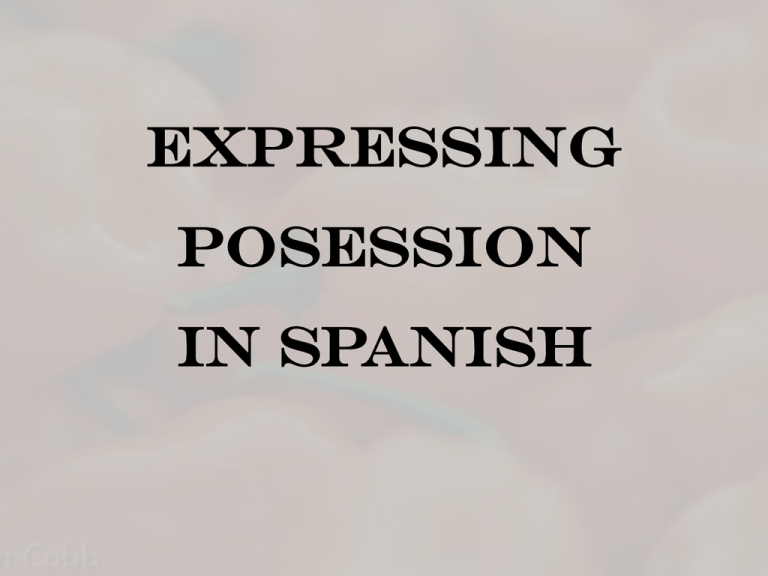
Expressing Posession in Spanish What English Speakers try to do… • In English, to express possession we use the possessive “s”. • For example – Those books are Mary’s. – My mom’s sister is coming to visit. • So, English speakers try to do this in Spanish. But… IT DOES NOT WORK LIKE THIS!!! • My dad’s car IS NOT mi padres carro. How it works in Spanish • To express possession in Spanish, we use “DE” • For example: –To say, “My mom’s sister” we actually say, “The sister of my mom.” • La hermana de mi madre. –To say, “My dad’s car” we say “The car of my dad.” • El carro de mi padre. Más ejemplos • El perro de Erin se llama Kramer. Erin’s dog is named Kramer. • El nombre de mi mejor amiga es Stephanie. My best friend’s name is Stephanie. • Los gatos de mi madre se llaman “Hamper” y “Elbie.” My mom’s cats are named Hamper and Elbie. • El carro de mi hermana es negro. My sister’s car is black. Possessive Adjectives • In English, our possessive adjectives are: – My, your, his, her, our, your (again) and their. – Example: • • • • • My book is in my backpack. Your sister is nice. Her plate is over there; his is on the table. Our dog is big. (Addressing a group of people) What’s your opinion? • Their house is for sale. Unstressed Possessive Adjectives en español Mi Mis Tu Tus Su Sus When something belongs to you, use mi or mis (depending on the plurality of whatever it is that’s yours). When something belongs to a peer you are talking to, use tu or tus (depending on the plurality of whatever it is that belongs to that person). When something belongs to an “usted” you are talking to or to someone you are talking about, use su or sus (depends on the plurality of whatever it is that belongs to that person). Nuestr@ Nuestr@s Vuestr@ Vuestr@s Su Sus To say “our”, use nuestro/a/os/as (depending on the GENDER and plurality of whatever it is that’s yours). To say “your” to a group of people in Spain, use vuestro/a/os/as (depending on the GENDER and plurality of whatever it is that’s theirs). To say “your” to a group of people in Latin America or “their” about people you are talking about, use su or sus (depends on the plurality of whatever it is that belongs). Unstressed Possessive Adjectives en español Mi casa Nuestr@ Nuestro apartamento Mis padres Nuestr@s Nuestras amigas Tu gato Vuestr@ Vuestra clase Tus clases Su Sus hijo estudiantes Vuestr@s Vuestros exámenes Su fiesta Sus composiciones Ejemplos • Mis libros pesan mucho (are heavy). My books are heavy. • ¿Son buenas tus clases? Are your classes good? • Mi casa es su casa. My house is your house. • Nuestras clases son interesantes. Our classes are interesting. • Clase, tengo vuestros exámenes. (España) Class, I have your exams. • Clase, tengo sus exámenes. (Latinoamérica) Class, I have your exams. • Mis amigas enseñan español en un colgeio, sus estudiantes son adolescentes. My friends teach Spanish at a high school, their students are teenagers.

